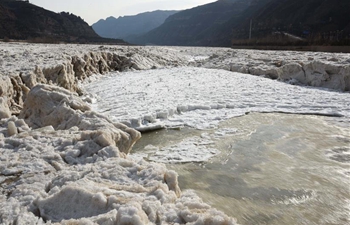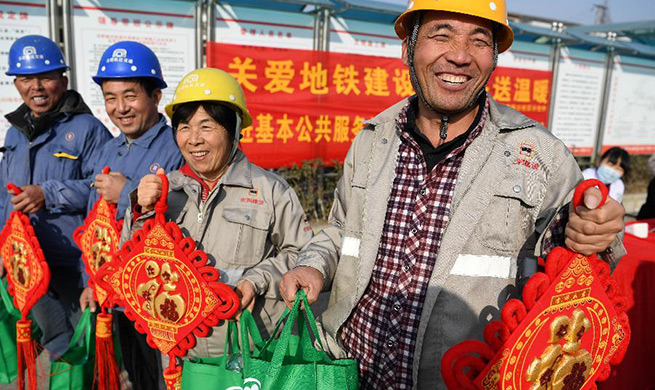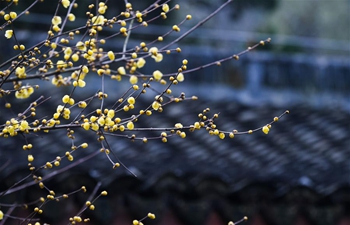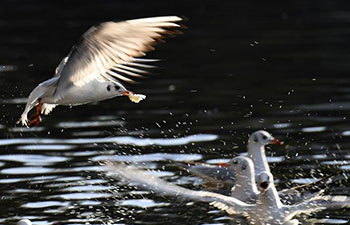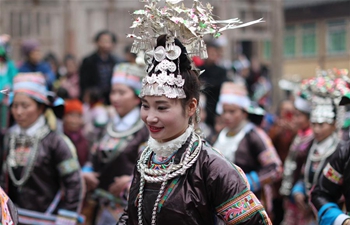URUMQI, Jan. 17 (Xinhua) -- Mamani never thought he would ski 300 kilometers from his hometown in the mountains to the city of Altay in northwest China's Xinjiang Uyghur Autonomous Region.
The 30-year-old herdsman, along with eight teammates, completed a 11-day journey skiing through the Altay Mountains on Wednesday, using ancient fur snowboards.
"We hope that more and more people can know about these ancient fur snowboards and take part in winter sports through our journey," he said.
The fur snowboards, which are made of pine wood and horsehide, have a history dating back more than 5,000 years.
The horsehide, which covers the snowboards, can provide friction when skiers go uphill.
Mamani's first snowboards were made by his father when he was eight years old.
Those were not real fur snowboards. Without horsehide, his father tied some ropes onto the snowboards to increase friction.
"Since ropes were not as good as horsehide at providing enough friction, I always failed to climb to the top of mountains using these snowboards," said Mamani.
His father made him a pair of real fur snowboards a year later, and taught young Mamani how to ski with them.
"These were my favorite toys in my childhood," he said.
The fur snowboards are born for mountains, he added, with the graining of the horsehide providing friction to help them climb mountains, while also helping to slide down the mountain smoothly.
The herdsmen in the Altay Mountains used fur snowboards to hunt and travel through mountains until the 1980s.
Mamani, who was born in 1989, regards skiing with them as a kind of extreme sport.
The reason for the difference in the use of the fur snowboards between Mamani's generation and that of his ancestors lies in the changes of herdsmen's lifestyle.
With the construction of roads and the increasing capability of snow removal, the village of Hemu, Mamani's hometown, has become one of the richest villages in the Xinjiang Uyghur Autonomous Region, and is also popular among tourists.
Mamani is not a traditional herdsman. He seldom feeds his livestock, but hires other herdsmen to take care of them.
He spends most of his time engaging in tourism, opening a homestay and a restaurant, and renting horses and sleighs for tourists.
Mamani's family earned around 150,000 yuan (22,000 U.S. dollars) last year, among which the income from tourism accounted for 86 percent.
Mamani now spends more time skiing than herding. Since 2008, he has made a pair of fur snowboards every year in order to take part in skiing competitions.
He made a pair of small fur snowboards for his eldest daughter and taught her how to ski with them last year, and he plans to teach his 5-year-old youngest daughter next year.
Mamani never stops studying skiing. He has made a lot of friends with skiers who have come from far and wide to ski in Hemu.
He taught many of them how to ski with the fur snowboards, and they taught him the skills of modern skiing.
Ski lovers in and around Hemu began to plot a journey through the Altay Mountains. They planned to spend ten days traveling 300 kilometers from Baihaba, near Hemu, to the city of Altay, traversing over 100 kilometers of uninhabited area.
Although Mamani had never experienced such a long and distant skiing adventure, he was determined to join them after talking with his heavily-pregnant wife.
"I was very confident because I had been to some places along the route where my father had taught me how to ski," he said.
The team of nine herdsmen started the journey wary of the dangers of snow drifts and getting lost.
On the fourth day of the journey, they climbed over one of the steepest mountains along the route, each dragging 40 kilograms of supplies. Zigzagging up mountains for 20 kilometers, they had traveled more than 44 kilometers in a whole day, including three hours' travel after dark.
On the sixth day, the team arrived in one of the most dangerous valleys, where they came across the footprints of wolves and the remains of wild animals.
On the seventh day, they entered into uninhabited areas without communication signal or forests where they could take shelter.
"There were a lot of dangers on the journey, including falling into one-meter-thick snow, and wading across unfrozen rivers," said Mamani.
"I want to tell my children to face life's difficulties bravely through the journey," he added. "Never giving up is the most valuable lesson that I have learned through skiing, and now I want to teach it to my children."
The team's journey ended in a ski resort in the city of Altay, with a series of modern devices including cable cars.
"I can imagine my daughters learning to ski in this resort in the future," Manami said.








